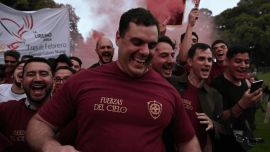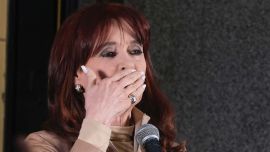Mexican President Andrés Manuel López Obrador said Tuesday he will ask the Senate to schedule a referendum on whether to investigate and possibly bring charges against his predecessors, including almost all of Mexico’s living ex-presidents.
The leader proposed the referendum for June 6, 2021, the date of midterm congressional elections that are key for holding on to López Obrador’s bare majority in Congress.
Lopez Obrador's proposed "people's consultation" targets Carlos Salinas de Gortari, Ernesto Zedillo, Vicente Fox, Felipe Calderón and Enrique Peña Nieto, whose terms in power stretched from 1988 to 2018.
He accused them of presiding over "excessive concentration of wealth, monumental losses to the treasury, privatisation of public property and widespread corruption."
Under Mexican law, the president has the right to request a referendum, and it is up to the Supreme Court to decide whether it is constitutional.
The referendum could be a way of drawing voters to the polls, because midterm votes in Mexico often have low turnout, and it could deflect attention from the current administration's problems with the economy and coronavirus pandemic, by focusing attention on past abuses.
López Obrador views the referendum as an indictment of corruption, conservative economic programmes and privatisations, not just what he claimed was “systematic corruption” since 1988.
“The social and humanitarian disasters we have suffered in this country over the last 30 years were the result of a series of conscious acts by those who governed during this period,” López Obrador said. “The evils I have enumerated did not occur by chance, but rather were the result of the application of a model over five presidential terms ... this tragic stage in the life of the country is called the neoliberal era.”
Acts of corruption can be punished under current law, but it is unclear whether López Obrador can investigate former leaders for policy decisions he disagrees with, like the widespread privatisations of government companies carried out by Salinas de Gortari, who governed Mexico from 1988 to 1994.
The president appeared to equate those policies with corruption; insiders were often given sweatheart deals on government contracts or privatisations.
“In the neoliberal period, corruption became the main function of political power,” he said. In the past, López Obrador had shied away from delving into past presidents' misdeeds, saying “revenge is not my strong point” and “forgive and forget.”
The only living president not mentioned by López Obrador is 98-year-old Luis Echeverría.
A specialised prosecutor’s office filed charges against Echeverría for a 1968 student massacre, but a tribunal exonerated him in 2007.
Separately, supporters of López Obrador's Morena party have been trying to collect about two million signatures on a petition to hold the referendum by Tuesday's deadline. The president said Tuesday he expected they would get that number.
Lopez Obrador has used his daily appearances in front of the media in recent weeks to highlight allegations against his rivals made by Emilio Lozoya, a former advisor to Peña Nieto.
Lozoya, the ex-head of state oil giant PEMEX, has implicated Peña Nieto, Calderón and Salinas during his corruption trial linked to Brazilian construction giant Odebrecht.
Lopez Obrador, a left-wing populist who came to power in 2018 vowing to clean up the graft-riddled country, has called on his predecessors to testify in court.
But he has been accused by Calderón of using Lozoya "as an instrument of revenge and political persecution."
Mexico is considered one of the world's most corrupt countries, ranked 130 out of 180 in Transparency International's Corruption Perceptions Index.
Lopez Obrador has overseen a series of referendums since taking office on controversial issues including his "Maya Train" railroad project and canceling a partially finished airport for Mexico City.
– TIMES/AFP/AP


























Comments